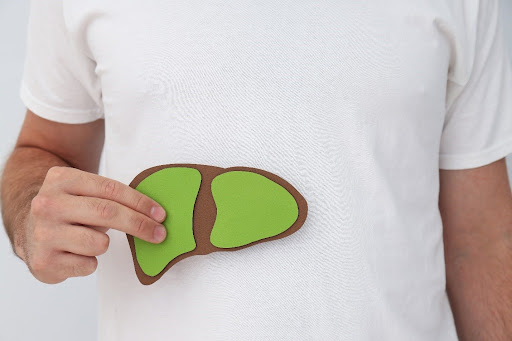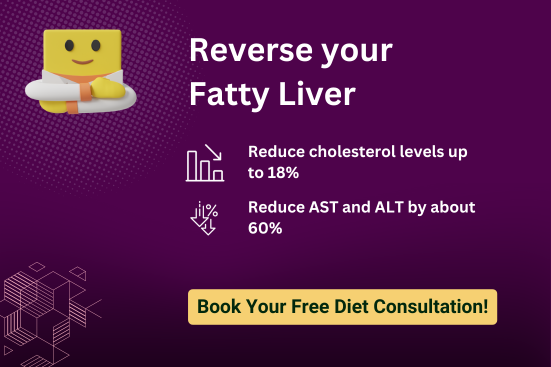A Dietary Guide to Gifting Your Fatty Liver a Long Life

Win the Battle Against Hepatic Steatosis: 5 Lifestyle Changes to Reverse Fatty Liver
22 Mar 2024
Fatty liver, also known as hepatic steatosis, is a growing health concern among many Indians, and it’s high time we addressed it. Fatty liver disease occurs when excess fat accumulates in the liver cells, impairing its vital functions. However, by adopting certain lifestyle changes, you can reverse fatty liver effectively and protect your liver’s health.
From dietary changes to weight management strategies, we’ve got it covered. We understand that each person is unique and that a one-size-fits-all approach rarely works. Therefore, we will not only discuss lifestyle changes but also focus on how to adapt them to suit your individual needs.
Embarking on a journey with a better understanding of these lifestyle changes and their impacts can make all the difference in reversing fatty liver disease. So, let’s delve into five key lifestyle shifts that can significantly contribute towards hepatic steatosis improvement.
Fats in Flight: Understanding Your Liver’s Needs
Your liver, a power-packed organ, plays a crucial role in your body’s digestion processes. When laden with excess fat, it struggles, leading to what is medically called hepatic steatosis or simply, fatty liver. To reverse fatty liver, understanding dietary needs is vital.
Reducing the intake of unhealthy fats, especially trans-fats found in processed food products like pastries and deep-fried snacks, is the first step to reverse fatty liver. Opt for healthier choices like monounsaturated fats found in olive oil and avocados or polyunsaturated fats present in fish and flaxseeds. These add flavour to your meals and are also considered optimal diets for reversing fatty liver and promoting better liver health.
A quick tip: Antioxidants found in berries and spinach are superheroes for your liver! These colourful foods fight off bad guys like oxidative stress and inflammation, helping your liver kick back into gear and reverse fatty liver.
Food Timing: Not Just What but When Matters
While what you eat is essential, when you eat, it also holds significance to manage and reverse fatty liver. Irregular eating patterns can lead to weight gain, a significant risk factor for fatty liver. Therefore, maintaining a regular meal schedule with balanced nutrients is paramount.
It is advisable to have smaller, more frequent meals rather than three large ones. This method assists in stabilising blood sugar levels to prevent insulin resistance, a common culprit behind fatty liver. Incorporating this lifestyle change can go a long way in hepatic steatosis improvement.
Shaking Up Sedentary Life: Movement Is Medicine
Weight management and fatty liver go hand in hand. Physical activity undoubtedly plays a pivotal role in ensuring overall bodily health and the liver isn’t an exception. Regular exercise helps to manage weight and reverse fatty liver by enhancing metabolism. It helps burn the excess fat stored not just around your waistline but also within your liver.
You don’t need to sprint or lift heavy weights immediately; start slow and gradually increase the intensity. Any form of physical activity, whether it’s brisk walking, cycling, swimming or even dancing, that gets your heart pumping can contribute to your liver’s health.
Hydration Station: Your Body’s Fuel

Drinking an adequate amount of water is as important as eating a balanced diet in the journey to reverse fatty liver. The amount of water required varies from person to person, but a general guideline is to consume at least 2 litres daily.
Enough hydration aids the liver in flushing out toxins and processing fats more effectively. It also keeps you satiated, thus reducing the likelihood of overeating.
Fun fact: It is not just plain water that counts. Fluids from fruits, vegetables and other healthy beverages like green tea also add to your hydration quota, thereby helping you improve your liver health
Sugar: The Sweet Deception
Sugar might make everything taste better, but its effects on your body are far from sweet. High sugar consumption can lead to increased fat accumulation in the liver, inhabiting hepatic steatosis improvement. Therefore, cutting down on sugar forms an essential part of the diet forreversing fatty liver.
Start by reading food labels to look out for hidden sugars in processed foods. Opt for natural sources of sweetness like fruits and limit your intake of sweetened beverages, desserts and processed snacks. Remember, every small step towards reducing sugar intake brings you closer to a healthier liver.
In conclusion, addressing fatty liver doesn’t demand a colossal overhaul of your lifestyle. Small, yet significant adjustments in your dietary habits and a commitment towards physical fitness can go a long way in hepatic steatosis improvement. It’s about consistently making healthier choices; eating mindfully, incorporating physical activities into your routine, managing your weight effectively and diligently following the recommended diet forreversing fatty liver.
Evidently, reversing fatty liver is a journey, and at Tatva Care, we are here to partner with you on this path towards better health. Our tailored health solutions and personalised care are designed to support you at every step of the way. So, why wait to start this life-changing journey? Get in touch with us today because when it comes to your health, every moment counts.

FAQs
Q. Can staying hydrated help reverse fatty liver?
A: Indeed! Keeping yourself well-hydrated is essential when dealing with a fatty liver. By drinking enough water, you aid your liver in carrying out its functions more efficiently. This helps in the gradual breakdown and removal of excessive fat accumulated within the liver.
Q. How do antioxidants contribute to tackling fatty liver?
A: Antioxidants are natural compounds that help your body fight oxidative stress, which can exacerbate fatty liver disease. They work by neutralising harmful free radicals in the body, thereby reducing inflammation and damage to liver cells. Foods rich in antioxidants such as berries, nuts and spinach can benefit those trying to reverse a fatty liver.
Q. What is the effect of adequate sleep on a fatty liver condition?
A: Good sleep isn’t just for maintaining your daily energy levels, it also plays a crucial role in reversing fatty liver disease. Sleep deprivation can lead to various metabolic disorders, including obesity, diabetes and non-alcoholic fatty liver disease. Therefore, ensuring sufficient and quality sleep is crucial for your liver’s health.
Q. Does engaging in physical activity benefit those with a fatty liver?
A: Absolutely. Regular exercise not only helps you maintain a healthy weight but also aids in metabolising and removing excess fat from your liver. It is recommended to incorporate both aerobic exercises like walking or cycling and strength-building activities into your routine to effectively combat fatty liver.
Q. Would reducing stress levels have any impact on reversing a fatty liver?
A: Yes, managing your stress levels is another key lifestyle change that can contribute towards reversing a fatty liver.

Medically reviewed by
Dr. Krunal Chaudhari 
MBBS, MD
Recent Blog
- AI in Healthcare: Not a Threat, but a Smart Ally
- Your Clinic. Your Website. Your Brand.
- CDSS – Revolutionising Diagnosis with AI-Powered Clinical Decision Support System
- Handwritten to Digital in Seconds: SmartSync Converts Prescriptions Instantly
- Voice Rx by TatvaPractice: A Smarter Way to Digitise Prescriptions
Archives
Categories
- Asthma (20)
- Diabetes (15)
- Fatty Liver (20)
- High Blood Pressure (2)
- High cholesterol (2)
- Hypertension (2)
- Insulin Resistance (1)
- Obesity (8)
- PCOS (6)
- TatvaPractice (13)
Let’s Connect
Quick contact




